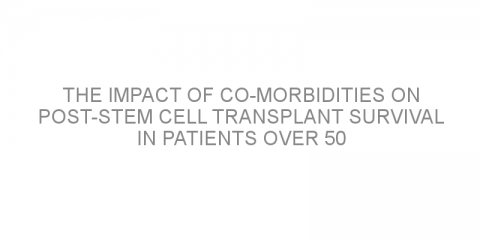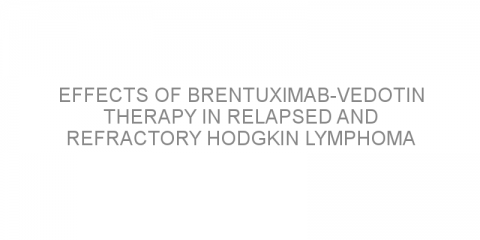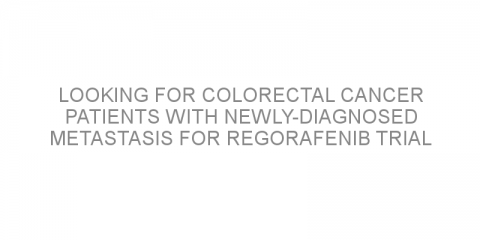In a nutshell This study compared the survival outcomes of two different age groups of relapsed and refractory Hodgkin lymphoma patients. The authors concluded that co-morbidities, not age, reduced survival rates after stem-cell surgery. Some background Hodgkin lymphoma (HL) is a type of cancer of the lymph system. It is generally highly...
Read MorePerformance status-1 – Slightly symptomatic Posts on Medivizor
Effects of brentuximab-vedotin therapy in relapsed and refractory Hodgkin lymphoma
In a nutshell This study evaluated the effectiveness of brentuximab-vedotin therapy in relapsed- and refractory Hodgkin lymphoma patients. The authors concluded that the treatment was safe and effective. Some background Some Hodgkin lymphoma patients are either unresponsive to treatment (refractory disease), or relapse soon...
Read MoreTreatments stratified by risk for relapsed or refractory Hodgkin lymphoma
In a nutshell This study determined whether risk-adapted, salvage-chemotherapy response improved survival in patients with relapsed or refractory disease. The authors concluded that treating patients based on their number of risk factors improved outcomes. Some background Some Hodgkin lymphoma patients either do not respond to treatment...
Read MoreAre end-of-treatment PET scans necessary?
In a nutshell This study investigated whether end-of-treatment PET scans could be left out if the mid-treatment scans were negative (no cancer activity). The authors concluded that the end-of-treatment scans were essential, even in patients with negative interim results. Some background Positron emission tomograpy (PET) scans are used to...
Read MoreABVD versus Stanford V chemotherapy for early-stage, bulky Hodgkin lymphoma
In a nutshell This trial compared the outcomes of ABVD and Stanford-V chemotherapy in patients with stage I or stage II bulky Hodgkin lymphoma. The authors concluded that both treatments were equally effective. Some background Hodgkin Lymphoma is a cancer of the lymph system. Patients with bulky disease have tumors larger than 10 cm....
Read MorePET-scans and treatment options in early-stage Hodgkin lymphoma
In a nutshell This trial examined the need for radiotherapy among early-stage Hodgkin lymphoma patients who responded well to chemotherapy. The authors concluded that in these patients, progression-free survival rates were high overall, but were slightly higher with additional radiation. Some background Hodgkin lymphoma is a cancer...
Read MoreWhen should radiotherapy be administered in combination with chemotherapy?
In a nutshell The authors aimed to determine when radiotherapy should be administered, during chemotherapy-radiotherapy adjuvant treatment in patients with limited small-cell lung cancer (SCLC). They concluded that radiotherapy increases the survival rate if it is administered early during chemotherapy treatment. Some background For SCLC,...
Read MoreCombining chemotherapy and targeted therapy for advanced squamous non-small-cell lung cancer
In a nutshell This trial examined whether the anti-cancer drug axitinib (Inlyta) is safe and effective in combination with chemotherapy for the treatment of advanced squamous non-small-cell lung cancer (NSCLC). The authors conclude that axitinib is safe and has anti-tumor activity. Some background Vascular endothelial...
Read MoreSearching for small-cell lung cancer patients to test pembrolizumab combined with chemotherapy and radiation
In a nutshell This phase 1 trial aims to determine the dosage of the anti-cancer drug pembrolizumab (Keytruda, or MK-3475) and whether it is effective at treating small-cell lung cancer (SCLC) when combined with both chemotherapy and radiation therapy. The main outcome of the trial will be the maximum tolerated dose (MTD – the highest dose of a...
Read MoreTesting biological therapy in treating KRAS-mutant NSCLC
In a nutshell This study aimed to assess the efficacy and safety of anti-cancer drug trametinib (Mekinist) in comparison to docetaxel (Taxotere) in treating patients with KRAS-mutation-positive advanced non-small-cell lung cancer (NSCLC). The study concluded that there was no difference in efficacy between trametinib and docetaxel however trametinib...
Read MoreLooking for colorectal cancer patients with newly-diagnosed metastasis for regorafenib trial
In a nutshell This phase 2 study recruiting in New York aims to determine the effectiveness of regorafenib (Stivarga) in patients with metastatic colorectal cancer. The main outcome will be time to disease progression. The details The standard treatment for metastatic (spread to other areas of the body) colorectal cancer is a combination of...
Read MoreThe potential of Nivolumab in treating advanced NSCLC
In a nutshell This study compared the efficacy of antitumor drugs nivolumab (Opdivo) and docetaxel (Taxotere) in the treatment of advanced non-small-cell lung cancer (NSCLC). The study concluded that nivolumab has better activity in advanced nonsquamous NSCLC which express the ligand PD-L1 and has a safer toxicity profile overall than docetaxel. Some...
Read More












